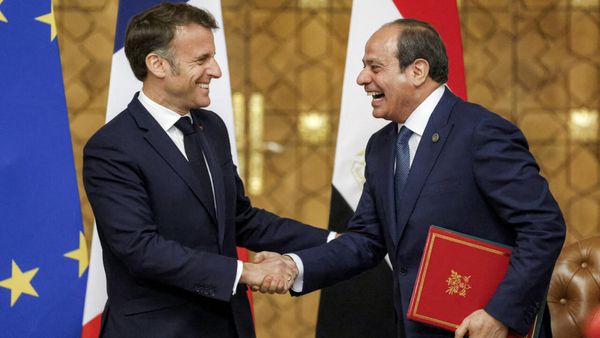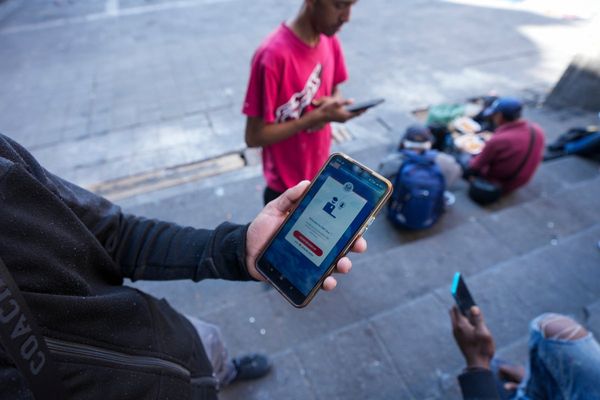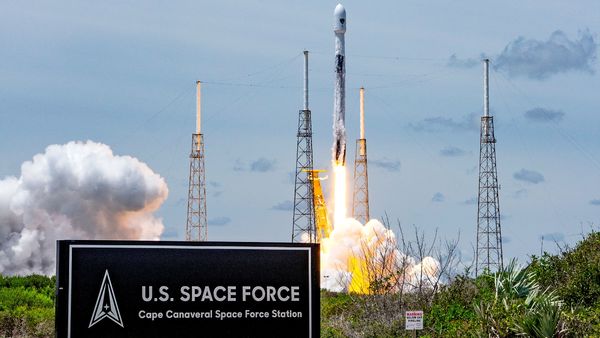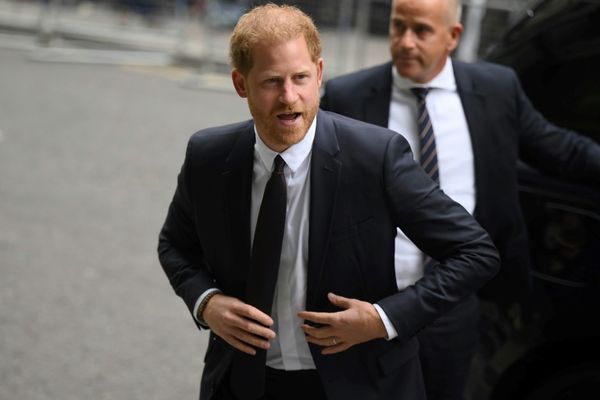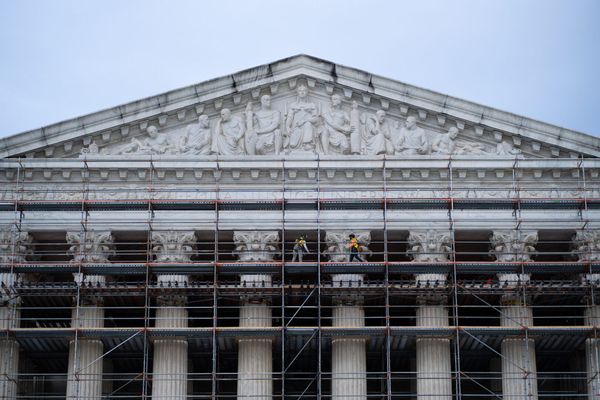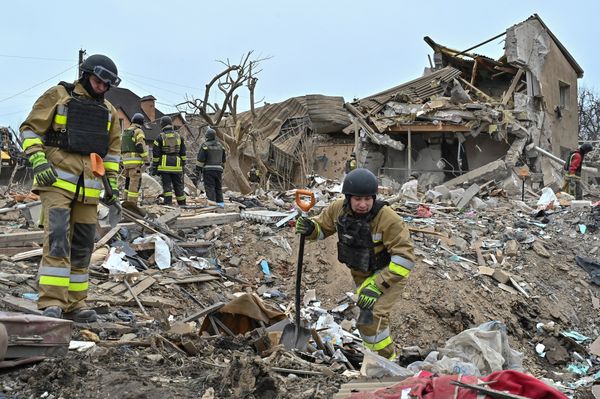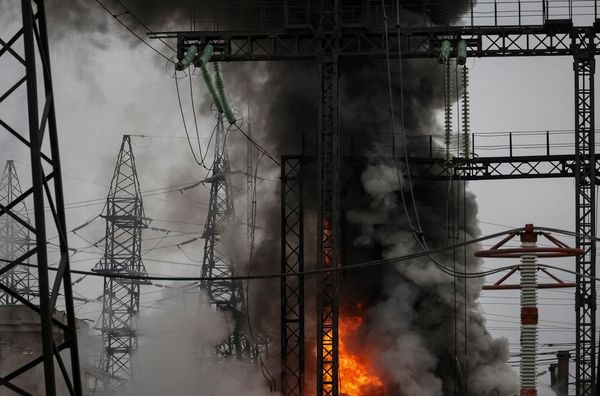
Summary of the day
Russia launched one of its largest missile and drone attacks on the country’s energy infrastructure to date.
More than a million Ukrainians were left without power.
Ukraine’s grid is got urgent assistance from Poland, Romania and Slovakia.
Ukraine’s state hydropower company said that a Russian strike hit the country’s largest dam, the DniproHES in Zaporizhzhia, but that there was no risk of a breach.
In a sharply-worded post, Volodymyr Zelenskiy, the Ukrainian president, said “Russian missiles have no delays, unlike aid packages for Ukraine.”
The EU’s high representative for foreign affairs, Josep Borrell, spoke out after Russia targeted Ukrainian energy infrastructure, writing that “this must stop! All responsible will be held to account.”
The Kremlin stepped up its rhetoric over the conflict, saying that Russia was “in a state of war” in Ukraine.
The Ukrainian government responded to a report in the Financial Times that the US had urged Ukraine to halt strikes on Russian oil refineries, with the deputy prime minister, Olha Stefanishyna, saying that oil refineries in Russian territory are legitimate military targets.
The European Commission proposed to increase the tariffs on imports into the EU of cereals, oilseeds, and derived products from Russia and Belarus.
EU heads of state and government met for a second day in Brussels, where they discussed issues including agriculture and the economy.
EU leaders will return to the issue of raising money for defence spending via the European Investment Bank in a couple of months, Paschal Donohoe, the president of the Eurogroup, said.
The prime ministers of Spain, Ireland, Malta and Slovenia issued a joint statement noting that “we discussed together our readiness to recognise Palestine and said that we would do so when it can make a positive contribution and the circumstances are right.”
Ahead of the European elections in June, leaders are keeping a close eye on farmers’ protests.
In their summit conclusions today, they wrote:
The European Council reverted to the current challenges in the agricultural sector and concerns raised by farmers.
It took stock of the ongoing work at European level. The European Council invites the Commission and the Council to take work forward without delay, notably on:
a) all possible short- and medium-term measures and innovative solutions, including those to reduce the administrative burden and to achieve simplification for farmers;
b) strengthening the position of farmers in the food supply chain, in particular to ensure a fair income;
c) easing the farmers’ financial strain by designing means of additional support, such as for example extending the temporary framework on State aid, and report back to the next European Council;
d) ensuring rules-based and fair competition globally and in the internal market;
e) addressing issues related to the Autonomous Trade Measures for Ukraine in a fair and balanced way while preparing a solution in the framework of the EU-Ukraine Association Agreement/Deep and Comprehensive Free Trade Area.
Updated
The German chancellor, Olaf Scholz, has said that Europe has expanded its support for Ukraine, will buy ammunition and weapons worldwide and also use the proceeds from frozen Russian assets for this purpose.
Wir haben beim #EUCO die Unterstützung für die Ukraine massiv ausgeweitet, werden weltweit Munition und Waffen kaufen und dafür auch Erträge aus eingefrorenen russischen Vermögen nutzen. Ein klares Zeichen, dass wir weitermachen - so lange wie nötig. Und eine Ermutigung für mehr! pic.twitter.com/Ct6NPXuWBX
— Bundeskanzler Olaf Scholz (@Bundeskanzler) March 22, 2024
EU commissioner Margaritis Schinas said on Friday that the EU could strike a deal with Lebanon to stem arrivals of migrants, as Cyprus complained it was being inundated by a surge in arrivals from the Middle East.
The EU has entered agreements with several countries to help them deal with increased migration burdens, and, ultimately, prevent a spillover into the 27 member states of the bloc, Reuters reports.
Rights groups have sharply criticised the pacts. Schinas, the European Commission’s vice-president for promoting the European way of life, said a deal with Lebanon could be brokered along the lines of one the EU signed with Egypt on 17 March. Considerable preparation was required, he said.
“We had worked with Egypt for quite some time, but I consider that it’s absolutely realistic to move in a corresponding manner with Lebanon,” he said during a visit to Cyprus.
Cyprus, the EU’s easternmost state, lies just 100 miles (160 km) from Syria and Lebanon, and arrivals of asylum seekers have been rising in recent months. Lebanon is in economic crisis and also hosts hundreds of thousands of Syrian refugees.
In the space of one day – 11 March - 458 Syrians arrived in Cyprus on six small boats. This month alone, authorities have registered 533 arrivals by sea, compared to 36 in March last year.
After meeting Schinas, Interior Minister Constantinos Ioannou said:
Our country … is facing asphyxiating pressure because of the large number of Syrians arriving in Cyprus.
Nicosia wants the bloc to consider declaring parts of war-ravaged Syria safe, which would allow authorities to repatriate people arriving from there.
Here is some footage that captured the moment a Russian missile hit Ukraine’s largest dam in the southern Zaporizhzhia region during its massive overnight attack on 22 March.
Slovakia on Friday rejected European Commission criticism of its closing down of a special prosecutor’s office dedicated to fighting corruption, saying the move did not violate EU law and that such investigations would continue.
The EU’s executive Commission said on Thursday it regretted Slovakia’s move which critics have said will damage democracy in the formerly communist country of 5.5 million people.
Ending the special prosecution unit USP, after two decades of work, was a major pledge of the new government of prime minister Robert Fico, who has accused the office of bias against his party and of violating human rights, Reuters said.
In a statement, the Justice Ministry said:
This [closure] is clearly not in conflict with EU law.
Closing the office was approved by lawmakers in a fast-track procedure that had raised EU concerns and strong criticism from the opposition and president Zuzana Caputova, who has challenged changes to the law concerning sentencing and statutes of limitations at the Constitutional Court.
Tens of thousands of Slovaks have protested against the government actions.
The Commission said on Thursday it would assess the consequences of the prosecution office’s closing and “not hesitate to take action to ensure respect of EU law and the protection of the EU’s financial interests”.
Cases handled by the office are to be handed to other prosecution branches, and the Justice Ministry said the approved law gave sufficient guarantees investigations would not be compromised.
The ministry said consultations with the Commission continue and any doubts about the changes were unfounded.
Anyone who thinks that Russia will stop in the Donbas and Crimea is mistaken, French president Emmanuel Macron said at the end of a EU summit in Brussels on Friday.
Asked about Kremlin comments about Russia regarding itself as at war due to the West’s intervention on Ukraine’s side, Macron said it would be a mistake to think Russia planned to halt its aggression in the Donbas and Crimea.
He added:
By using this term, one is also even opening up uncertainty about Russia’s military objectives.
The president of the European Council has said he does not want to give the impression to European citizens that the continent is on the verge of war.
Just days after he urged EU leaders to take “concrete steps to be defence-ready and put the EU’s economy on a war footing”, Charles Michel said:
“I want to be clear. On the one hand, we don’t want to spread anxiety in European societies. This is very clear. On the other hand, we must be lucid and we must tell our … citizens all across the EU.
“If we want peace and we want, security and stability it is extremely important to improve our defence capacities or defence capabilities and to build a European a true European Union in defence”.
The US has issued a statement responding to EU leaders’ decision to open accession talks with Bosnia and Herzegovina.
The United States welcomes the European Council’s decision to open accession negotiations with Bosnia and Herzegovina.
This is an important milestone in BiH’s history and a key step toward securing the country’s rightful place in the Euro-Atlantic community of nations.
The United States will continue to support Bosnia and Herzegovina’s territorial integrity, sovereignty, and multiethnic character and to help it progress toward membership in the European Union.
The United States welcomes the European Council’s decision to open accession negotiations with Bosnia and Herzegovina. This is an important milestone in BiH’s history and a key step toward securing the country’s rightful place in the Euro-Atlantic community of nations.
— US Embassy Sarajevo (@USEmbassySJJ) March 22, 2024
The…
Here is the full statement from the prime ministers of Spain, Ireland, Malta and Slovenia:
We, the Prime Ministers of Ireland, Malta, Slovenia and Spain, met in the margins of the European Council to share views on the situation in Gaza and the Middle East.
We welcome the Conclusions adopted by the European Council yesterday.
We are agreed on the urgent need for an immediate ceasefire, the unconditional release of hostages and a rapid, massive and sustained increase of humanitarian aid into Gaza.
We are agreed that the only way to achieve lasting peace and stability in the region is through implementation of a two-state solution, with Israeli and Palestinian States living side-by-side, in peace and security.
We discussed together our readiness to recognise Palestine and said that we would do so when it can make a positive contribution and the circumstances are right.
Hoy, España, Eslovenia, Irlanda y Malta nos hemos comprometido a reconocer al Estado palestino.
— Pedro Sánchez (@sanchezcastejon) March 22, 2024
La UE llama a un alto el fuego, a la apertura de los corredores terrestres y a impulsar una conferencia de paz que lleve a la solución de los dos Estados.https://t.co/9oo6rq0WK9 pic.twitter.com/58XdEw2SXB
Updated
Four countries agree to recognise Palestinian state 'when conditions are appropriate & circumstances can contribute to the successful peace process'
Together with [Spain, Ireland and Slovenia] we agreed to recognise the Palestinian State when conditions are appropriate & circumstances can contribute to the successful peace process,” Malta’s prime minister, Robert Abela, has said.
“We also agreed on the need of an immediate ceasefire, release of hostages & increase of humanitarian aid into Gaza,” he added.
Together with 🇪🇸🇮🇪🇸🇮 we agreed to recognise the Palestinian State when conditions are appropriate & circumstances can contribute to the successful peace process.We also agreed on the need of an immediate ceasefire,release of hostages & increase of humanitarian aid into Gaza. - RA
— Robert Abela (@RobertAbela_MT) March 22, 2024
Updated
The Council of the EU today formally decided to impose restrictive measures against 33 individuals and two entities linked to the death of Russian opposition politician Alexei Navalny.
“Alexei Navalny’s slow killing by the Kremlin regime is a stark reminder of its utter disregard for human life,” said Josep Borrell, the EU’s foreign policy chief.
“Today’s sanctions demonstrate our determination to hold Russia’s political leadership and authorities to account for the continuing violation of the human rights in Russia,” he said.
Four EU countries – Ireland, Spain, Malta and Slovenia – are considering recognising Palestine as a state, their prime ministers have said.
In a statement signed by Leo Varadkar, Pedro Sánchez, Robert Golob and Robert Abela, the four leaders said they met yesterday on the sidelines of the summit to discuss the matter.
“We are agreed on the urgent need for an immediate ceasefire, the unconditional release of hostages and a rapid, massive and sustained increase of humanitarian aid into Gaza.
“We are agreed that the only way to achieve lasting peace and stability in the region is through implementation of a two-state solution, with Israeli and Palestinian States living side-by-side, in peace and security.
“We discussed together our readiness to recognise Palestine and said that we would do so when it can make a positive contribution and the circumstances are right.”
The EU leaders’ summit has ended.
Footage today showed flames and smoke billowing from the dam after Moscow launched one of its largest assault on Ukraine’s energy infrastructure
Watch here:
EU leaders will return to the issue of raising money for defence spending via the European Investment Bank in a couple of months, Paschal Donohoe, the president of the Eurogroup of finance ministers of countries who use the euro.
After a parallel meeting at the council of EU leaders in Brussels, he confirmed that the issue had been discussed but said there was “no low hanging fruit” but they are going to investigate further the possibility of changing rules which limit the range of permissible defence investments including dual military and commercial use technologies.
“I know the EIB are looking at that at the moment and I believe they’re going to come back to ministers in the next couple of months with some work done and what options could be in that area,” said Donohoe.
The EIB’s new chief Nadia Calviño has already said they are “ready to do more and better” to contribute to join projects.
The Ukrainian government has responded to a report in the Financial Times that the US had urged Ukraine to halt strikes on Russian oil refineries.
The deputy prime minister, Olha Stefanishyna, said that oil refineries in Russian territory are legitimate military targets.
Responding to the FT story, she said Ukraine is “achieving its goals” and “very successful operations” carried out on the territory of the Russian Federation.
“There are also statements by other officials that these are absolutely legal goals from a military point of view. We understand the appeals of American partners. At the same time, we are fighting with the capabilities, resources and practices that we have today,” she said, Hromadske reported.
Updated
The outgoing Dutch prime minister, Mark Rutte, who is a frontrunner to become the next secretary-general of Nato, has met with the leaders of the Czech Republic and Denmark to discuss the delivery of ammunition to Ukraine.
It was good to speak today with Czech Prime Minister Petr Fiala (@P_Fiala) and Danish Prime Minister Mette Frederiksen (@Statsmin) about the delivery of ammunition to Ukraine. Thanks to the initiative by the Czech Republic, a large amount of ammunition will be sent to Ukraine in… pic.twitter.com/FwQrj73vpz
— Mark Rutte (@MinPres) March 22, 2024
'This must stop', Borrell says after Russian strikes
The EU’s high representative for foreign affairs, Josep Borrell, has spoken out after Russia targeted Ukrainian energy infrastructure.
“This must stop! All responsible will be held to account,” he wrote.
Russia continues its brutal attacks against Ukraine's population with overnight drone & missile bombing of energy infrastructures, killing & wounding dozens, jeopardizing the safety of the Zaporizhzhia Nuclear Power Plant.
— Josep Borrell Fontelles (@JosepBorrellF) March 22, 2024
This must stop! All responsible will be held to account.
The eurozone summit has ended, and leaders are now discussing agriculture.
❗️#Eurosummit conclusions adopted 👇 https://t.co/VOD1psPnQl pic.twitter.com/kIt5XuAxnD
— Ecaterina Casinge (@ecasinge) March 22, 2024
Updated
The Financial Times reported this morning that the US had urged Ukraine to halt strikes on Russian oil refineries.
In response to the report, Kremlin spokesman Dmitry Peskov said “this is a matter for the United States. We would prefer that the United States call on the Kyiv regime to abandon its essence, and above all terrorist activity against civilian targets and residential homes,” Reuters reported.
Maia Sandu, the Moldovan president, has reiterated calls for more aid for Kyiv.
“Ukraine needs to be provided with whatever it needs so it can resist the invasion and defend peace in Europe,” she said.
This morning, Russia launched over 90 missiles and 60 Shahed drones across Ukraine, hitting critical infrastructure. Their aggression knows no bounds. Ukraine needs to be provided with whatever it needs so it can resist the invasion and defend peace in Europe.
— Maia Sandu (@sandumaiamd) March 22, 2024
‘Mistakes are setting the course of the entire century,’ Lithuanian minister says
The Lithuanian foreign minister, Gabrielius Landsbergis, has strongly criticised western policies toward Ukraine after the latest Russian strikes targeting Ukraine.
“We choked the weapons supply, we failed to provide enough air defence, and now we ask Ukrainians to sit on their hands while cruise missiles land on their families,” he said, adding: “Such mistakes are setting the course of the entire century. And there is no justification for any of this.”
We choked the weapons supply, we failed to provide enough air defence, and now we ask Ukrianians to sit on their hands while cruise missiles land on their families. Such mistakes are setting the course of the entire century. And there is no justification for any of this. pic.twitter.com/ILreho4v1R
— Gabrielius Landsbergis🇱🇹 (@GLandsbergis) March 22, 2024
Ukraine’s defence ministry has shared data about the types of drones and missiles it says Russia had used overnight.
Overnight, Ukrainian forces shot down 92 of the 151 russian aerial targets.
— Defense of Ukraine (@DefenceU) March 22, 2024
The terrorist state attacked Ukraine with:
•63 Shahed UAVs
•12 Iskander-M ballistic missiles
•40 Kh-101/Kh-555 cruise missiles
•5 Kh-22 cruise missiles
•7 Kh-47 M2 (Kinzhal) aeroballistic missiles… pic.twitter.com/orRb9pSd5I
Ukrainian energy grid gets help from abroad
After Russian strikes targeted Ukrainian energy infrastructure, Ukraine’s grid is getting urgent assistance from Poland, Romania and Slovakia, national grid operator Ukrenergo said, Reuters reported.
Russia is at war due to Western intervention, Kremlin spokesperson says
Russia regards itself to be in a state of war due to the West’s intervention on Ukraine’s side, the TASS news agency quoted Kremlin spokesman Dmitry Peskov as saying, Reuters reported.
EU to impose tariff on Russian grain
The EU is set to impose a tariff of up to 50% on Russia grain imports amid fears that the Kremlin could flood the bloc with cut cost wheat to destabilise the European market
The proposal, unveiled by the European commission president Ursula von der Leyen, follows a plea yesterday to EU leaders by Ukrainian president, Volodymyr Zelenskiy, to do something about grain “stolen” from occupied territories by the Russians.
“We propose the imposition of tariffs on these Russian imports to mitigate the growing risk to our markets and our farmers. They will reduce Russia’s capacity to exploit the EU for the benefit of its war machine,” she said.
But it is mainly intended to head off a potential illegal dumping of grain as the Kremlin seeks to weaponise as much as it can in its war against Ukraine.
Updated
'Russian missiles have no delays', Zelenskiy says, stressing 'cost' of postponed aid decisions
In a sharply-worded post this morning responding to Russian attacks targeting energy infrastructure, Volodymyr Zelenskiy, the Ukrainian president, said “Russian missiles have no delays, unlike aid packages for Ukraine.”
He added:
“Shahed” drones have no indecision, unlike some politicians.
It is critical to understand the cost of delays and postponed decisions.
Patriot systems must protect Kharkiv and Zaporizhzhia; air defense is required to protect people, infrastructure, homes, and dams.
Our partners know exactly what is needed. They can definitely support us. These are necessary decisions. Life must be protected from these savages from Moscow.
This night, Russia launched over 60 "Shahed" drones and nearly 90 missiles of various types at Ukraine. The world sees the Russian terrorists' targets as clearly as possible: power plants and energy supply lines, a hydroelectric dam, ordinary residential buildings, and even a… pic.twitter.com/5dX2fAMMiE
— Volodymyr Zelenskyy / Володимир Зеленський (@ZelenskyyUa) March 22, 2024
Here are the latest images from Ukraine this morning.
More than 1 million without power in Ukraine following strikes
More than 1 million consumers across Ukraine were without power after overnight Russian air strikes on energy facilities, Reuters reported citing a top presidential official.
The strikes had affected around 700,000 residents in Kharkiv region, at least 200,000 each in the southern Odesa and southeastern Dnipropetrovsk regions and 110,000 in the Poltava region, according to Oleksiy Kuleba, deputy head of the presidential administration.
Updated
'Ukraine needs more air defence systems', ministry says following strikes
After the latest round of Russian strikes targeting Ukrainian energy infrastructure, Ukraine’s defence ministry reiterated a plea to the west for more air defences.
“Ukraine needs more air defense systems to protect our people and infrastructure from missile attacks. The world needs to defeat russian evil,” it said.
Overnight, russia attacked Ukraine with more than 60 Shahed UAVs and almost 90 missiles of various types.
— Defense of Ukraine (@DefenceU) March 22, 2024
The main targets for russian terrorists are energy facilities, including Ukraine's largest hydroelectric power plant, and apartment buildings.
Ukraine needs more air… pic.twitter.com/f8s5qE88Cn
Russian strike hit Ukraine's largest dam, Kyiv says
Ukraine’s state hydropower company said today that a Russian strike hit the country’s largest dam, the DniproHES in Zaporizhzhia, but that there was no risk of a breach, Reuters reported.
“There is currently a fire at the station. Emergency services and energy workers are working on the spot, dealing with the consequences of numerous airstrikes,” said Ukrhydroenerho, which runs Ukraine’s network of dams.
Herman Halushchenko, the Ukrainian energy minister, said it was the largest attack on Ukraine’s energy infrastructure in the recent past.
“The goal is not just to damage, but to try again, like last year, to cause a large-scale failure of the country’s energy system,” he wrote on Facebook, according to Reuters.
Kyiv says Russia launched mass strike on energy infrastructure
Ukraine said this morning that Russian drones and missiles targeted power plants, energy supply lines, a hydroelectric dam, and residential buildings.
Over 60 drones & nearly 90 missiles of various types, 🇷🇺 launched to attack Ukraine today
— MFA of Ukraine 🇺🇦 (@MFA_Ukraine) March 22, 2024
The targets were power plants & energy supply lines, hydroelectric dam, residential buildings, even a trolleybus
Every delayed decision to aid 🇺🇦 has consequences#RussiaIsATerroristState pic.twitter.com/VW8v3lpg3H
Welcome to the blog
Good morning and welcome back to the blog, where today we will be looking at the latest updates from an EU leaders’ summit in Brussels and from Ukraine.
Send tips to lili.bayer@theguardian.com.
